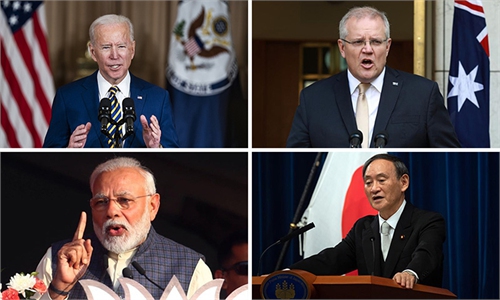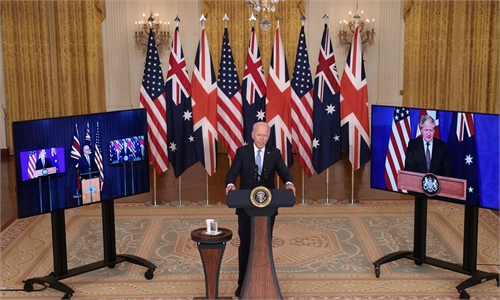COMMENTS / EXPERT ASSESSMENT
Submarine deal creates dangerous domino effect for regional balance

Illustration: Tang Tengfei/GT
French President Emmanuel Macron on Tuesday discussed cooperation in the Indo-Pacific region with Indian Prime Minister Narendra Modi, after the AUKUS submarine deal spiraled into an unprecedented diplomatic crisis between Western allies. In telephone communication, Macron and Modi said they would "act jointly" in the area.
While dealing with the fallout from Australia's sudden junking of a $66 billion submarine deal, France's reaching out to India, a major importer of Defense equipment and technology that is tilting towards Western powers to counter China, represents a calculated move by Macron, prevent the US snapping up lucrative defense and commercial contracts in India and seek an alternative market to replace Australia.
In line with the nation's Indo-Pacific strategy, France has been strengthening its cooperation with regional countries including India, Australia, and Japan. After being "stabbed in back" by the US and Australia over the submarine deal, a major concern for French officials is that other regional powers like India will follow Australia to ink arm purchase deals with the US. At the same time, Paris is eager to expand another market to close the massive gap left by Australia. The latest engagement between France and India shows that the knock-on effect of the submarine crisis provoked by the US has spilled over into other countries in the region, and this development should put everyone on notice.
Firstly, the AUKUS submarine deal has set a terrible example for regional countries and risks to exacerbate a regional arms race. If more regional countries choose to follow suit and sacrifice regional stability for their own interests, this will cause a destructive blow to regional economic development and peace and stability.
If France increases its arms sales to India for the purpose of finding new potential markets, this will directly provoke and affect neighboring countries, including China. This may trigger a series of dominoes which will inevitably negatively impact regional security.
Second, unlike the original submarine deal between France and Australia, the AUKUS submarine deal is targeted at China, the US and UK pledge to help Australia build a fleet of eight nuclear-powered submarines, which will largely increase the risk of nuclear proliferation in the Indo-Pacific region and lead to a sharp escalation of regional tensions.
For both France and India, it's crucial to recognize that in face of the current crisis caused by the US and Australia's irresponsible actions, all parties need to make active efforts to ease regional tensions instead of allowing the tension spread to a wider scale and spiral out of control.
While it is unclear how Biden will try to ease the worst diplomatic spat with France in recent memory, France should not accept betray by its allies' that has severely undermined multilateral cooperation mechanisms on nuclear proliferation and arms control.
For countries like India, regional matters should be handled and resolved through a regional focus, no nation should pin their hope on interference from extraterritorial forces. When outside power seeks to meddle it affairs in other part of the world, it is not for the growth and security of that region, but instead to sell their own weapons and appease influential domestic lobby groups or constituents.
The current nuclear submarine crisis should not be used to play up China-Indian tensions, allowing external forces to drive wedge between China and India to create new excuses for increasing arms sales to India.
The author is director of the Department of European Studies, China Institute of International Studies. bizopinion@globaltimes.com.cn


